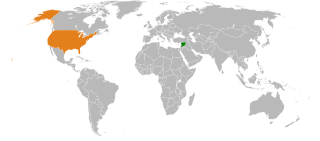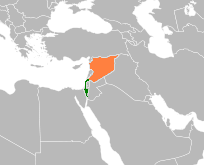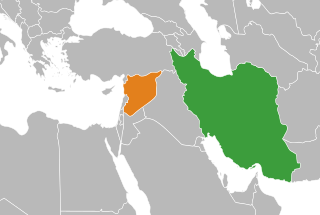0-9
| | This section is empty. You can help by adding to it. (September 2012) |
This page list topics related to Syria.
| | This section is empty. You can help by adding to it. (September 2012) |
| | This section is empty. You can help by adding to it. (July 2010) |
| | This section is empty. You can help by adding to it. (July 2010) |
| | This section is empty. You can help by adding to it. (July 2010) |
| | This section is empty. You can help by adding to it. (July 2010) |
| | This section is empty. You can help by adding to it. (July 2010) |
| | This section is empty. You can help by adding to it. (July 2010) |

Ensuring national security, increasing influence among its Arab neighbours and securing the return of the Golan Heights, have been the primary goals of the Syrian Arab Republic's foreign policy. At many points in its history, Syria has seen tension with its neighbours, such as Turkey, Israel, Jordan, Iraq, and Lebanon. Syria enjoyed an improvement in relations with several of the states in its region in the 21st century, prior to the Arab Spring and the Syrian Civil War.

The Alawite State, officially named the Territory of the Alawites, after the locally-dominant Alawites from its inception until its integration to the Syrian Federation in 1922, was a French mandate territory on the coast of present-day Syria after World War I. The French Mandate from the League of Nations lasted from 1920 to 1946.

Latakia or Lattakia is the principal port city of Syria and capital city of the Latakia Governorate located on the Mediterranean coast. Historically, it has also been known as Laodicea in Syria or Laodicea ad Mare. In addition to serving as a port, the city is a significant manufacturing center for surrounding agricultural towns and villages. According to the 2004 official census, the population of the city is 383,786, however its population greatly increased as a result of the ongoing Syrian Civil War, which led to an influx of refugees from rebel held areas. It is the 4th-largest city in Syria after Aleppo, Damascus, and Homs. It borders Tartus to the south, Hama to the east, and Idlib to the north, and Cape Apostolos Andreas, the north-eastern tip of Cyprus, is about 109 kilometres (68 mi) away.

Bashar Hafez al-Assad is a Syrian politician who is the 19th president of Syria, since 17 July 2000. In addition, he is the commander-in-chief of the Syrian Armed Forces and the Secretary-General of the Central Command of the Arab Socialist Ba'ath Party, which nominally espouses a neo-Ba'athist ideology. His father and predecessor was General Hafez al-Assad, whose presidency between 1971 to 2000 marked the transfiguration of Syria from a republican state into a dynastic dictatorship tightly controlled by an Alawite-dominated elite composed of the armed forces and the Mukhabarat, who are loyal to the Assad family.

Latakia Governorate, also transliterated as Ladhakia Governorate, is one of the 14 governorates of Syria. It is situated in western Syria, bordering Turkey's Hatay Province to the north, Idlib and Hama Governorates to the east, Tartus Governorate to the south, and the Mediterranean Sea to the west. Its reported area varies in different sources from 2,297 km2 (887 sq mi) to 2,437 km2 (941 sq mi). The governorate has a population of 1,008,000.
Religion in Syria refers to the range of religions practiced by the citizens of Syria. Historically, the region has been a mosaic of diverse faiths with a range of different sects within each of these religious communities. The majority of Syrians are Muslims, of which the Sunnis are the most numerous, followed by the Shia groups, and Druzes. In addition, there are several Christian minorities. There is also a small Jewish and Yazidi community.

Diplomatic relations between Syria and the United States are currently non-existent; they were suspended in 2012 after the onset of the Syrian Civil War. Priority issues between the two states include the Arab–Israeli conflict, the Golan Heights annexation, and the Iraq War.

The following outline is provided as an overview of and topical guide to Syria:

Russia–Syria relations are the bilateral relations between Russia and Syria. Russia has an embassy in Damascus and Syria has an embassy in Moscow. Russia enjoys a historically strong, stable, and friendly relationship with Syria, as it did until the Arab Spring with most of the Arab countries. Russia's only Mediterranean naval base for its Black Sea Fleet is located in the Syrian port of Tartus.

The Embassy of Syria in Washington, D.C. is the suspended diplomatic mission of the Syrian Arab Republic to the United States. The final ambassador of the Syrian Arab Republic was Imad Moustapha. A Charge D'Affaires has not been named.

Iraq–Syria relations are the bilateral relations/diplomatic relations between the Sovereign states of Iraq and Syria. Since both nations are neighbours, they share the Iraq–Syria border. Relations are marked by long-shared cultural and political links, as well as former regional rivalry. The two countries took their present form after the Sykes–Picot Agreement to dismember the Ottoman Empire into British and French spheres of influence after World War I.

Turkey–Syria relations are the relations between Turkey and the Syrian Arab Republic. Turkey shares its longest common border with Syria; various geographic and historical links also tie the two neighbouring countries together.

Israel–Syria relations refer to the bilateral ties between the State of Israel and the Syrian Arab Republic. The two countries have been locked in a perpetual war since the establishment of Israel in 1948, with their most significant and direct armed engagements being in the First Arab–Israeli War in 1948–1949, the Third Arab–Israeli War in 1967, and the Fourth Arab–Israeli War in 1973. Additionally, Israeli and Syrian forces also saw relatively extensive combat against each other during the Lebanese Civil War, the 1982 Lebanon War, as well as the War of Attrition. Both states have at times signed and held armistice agreements, although all efforts to achieve complete peace have been without success. Syria has never recognized Israel as a legitimate state and does not accept Israeli passports as legally valid for entry into Syrian territory; Israel likewise regards Syria as a hostile state and generally prohibits its citizens from travelling there, with some exceptions and special accommodations being made by both countries for Druze people residing in Syria and the Golan Heights. Israel and Syria have never established formal diplomatic relations since the inception of both countries in the mid-20th century.

Armenian–Syrian relations are foreign relations between Armenia and Syria. Armenia has an embassy in Damascus and a consulate general in Aleppo. In 1997, Syria opened an embassy in Yerevan. Syrian Foreign Minister Farouk al-Sharaa visited Armenia in March 1992.

The modern history of Syria begins with the termination of Ottoman control of Syria by French forces and the establishment of the Occupied Enemy Territory Administration during World War I. The short-lived Arab Kingdom of Syria emerged in 1920, which was however soon committed under the French Mandate, which produced the short-lived autonomous State of Aleppo, State of Damascus, Alawite State and Jabal al-Druze (state); the autonomies were transformed into the Mandatory Syrian Republic in 1930. Syrian Republic gained independence in April 1946. The Republic took part in the Arab-Israeli War and remained in a state of political instability during the 1950s and 1960s.

Syria and Iran are strategic allies. Syria is usually called Iran's "closest ally", with ideological conflict between the Arab nationalism ideology of Syria's secular ruling Ba'ath Party and the Islamic Republic of Iran's pan-Islamist policy notwithstanding. Iran and Syria have had a strategic alliance ever since the Iran–Iraq War, when Syria sided with non-Arab Iran against neighbouring Ba'ath-ruled Iraq. The two countries shared a common animosity towards then Iraqi president Saddam Hussein and coordination against the United States and Israel.

Saudi Arabia–Syria relations refer to diplomatic and economic relations between Saudi Arabia and Syria. Diplomatic ties between these two countries of the Middle East have long been strained by the major events in the region. Relations between Saudi Arabia and Syria deteriorated further following the Syrian Civil War and Saudi Arabia's numerous calls for Bashar Assad to be removed from power. Saudi Arabia cut off relations with Syria after they decided to close its embassy in Damascus and expel the Syrian ambassador in 2012.

Presidential elections were held in Syria on 3 June 2014. There is a scholarly consensus that the elections were not democratic. The result was a landslide victory for Bashar al-Assad, who received over 90% of the valid votes. He was sworn in for a third seven-year term on 16 July in the presidential palace in Damascus.

The history of Syria covers events which occurred on the territory of the present Syrian Arab Republic and events which occurred in the region of Syria. Throughout ancient times the territory of present Syrian Arab Republic was occupied and ruled by several empires, including the Sumerians, Mitanni, Assyrians, Babylonians, Egyptians, Hittites, Canaanites, Phoenicians, Arameans, Amorites, Persians, Greeks and Romans. Syria is considered to have emerged as an independent country for the first time on 24 October 1945, upon the signing of the United Nations Charter by the Syrian government, effectively ending France's mandate by the League of Nations to "render administrative advice and assistance to the population" of Syria, which came in effect in April 1946.
The following is a timeline of the Syrian Civil War from January to April 2016. Information about aggregated casualty counts is found at Casualties of the Syrian Civil War.